Automotive
/Home & Leisure
Jurors blame Tesla for fatal Florida Keys crash, award victims $242 million
A Miami jury on Friday found fault with the Autopilot system of one of the world’s most influential electric vehicle makers and awarded the survivors of a horrendous crash in the Florida Keys that left a woman dead and her boyfriend critically injured, $242.6 million.
The jury needed just seven hours to determine that industry leader Tesla ...Read more

Ford sales up 7% so far this year, powered by trucks
Ford Motor Co. sold roughly 9% more vehicles in July compared to the same time last year, boosted by the continued popularity of the Dearborn, Michigan, automaker's trucks and SUVs.
Ford sales so far this year are up 7%, with more than 1.3 million sold in 2025 versus about 1.2 million in the first half of 2024. Trucks remain Ford's top sellers,...Read more

Auto review: 2025 VW Golf GTI delivers hatchback fun
Even though the manual transmission was eliminated with the 2024 model, the Volkswagen Golf GTI still offers tremendous fun and functionality to consumers. This model has been a staple of the VW fleet for years, and it's not surprising that it maintains a large following.
This week in Grasso’s Garage we tested a slate blue metallic Golf GTI ...Read more

Auto review: 2025 BMW X6M Competition shouldn't work, but it does
There was a time when a BMW coupe meant grace, balance, rear-wheel drive and sublime steering feel. The 2025 BMW X6 M Competition is anything BUT that. It’s a mind-ripping, retina-peeling, money-to-burn, Bavarian Rottweiler that’s unapologetically loud, brutally fast — and shaped like a sneaker. Nonetheless, it’s not so much driven as ...Read more

Auto review: Genesis G80 gets comfortable in its own skin
GAYLORD, Michigan — Hyundai’s luxury brand, Genesis, announced this year its intent to enter the world of elite motorsports in 2026 — joining the big boys in the IMSA Weathertech/WEC World Endurance Championship’s Hyper class.
It’s a natural progression for a brand that makes the terrific G80 sedan that I just stormed Michigan’s ...Read more

Here's how Ford is responding to the carbon emissions regulation cuts
Ford Motor Co. is cutting its spending on emissions compliance credits and forecasting a "multi-billion dollar opportunity" over the next two years under President Donald Trump's pullback of greenhouse gas emissions and fuel economy regulations.
With federal fuel economy standard penalties set to zero, a proposal by the U.S. Environmental ...Read more

Detroit Three fear foreign competitors will pay less in tariffs. Here's what the data show
The Detroit Three automakers and the United Auto Workers have raised concerns about new U.S. tariff deals with Japan and the European Union, which include rates lower than those for Canada and Mexico. But federal data show duties paid on overall auto imports from the U.S. neighbors are less than the 15% rate President Donald Trump negotiated ...Read more

Ford issues tariff-hit guidance after reporting Q2 loss from special charges
Ford Motor Co. on Wednesday declared a net loss of $36 million in the second quarter of 2025 related to one-time charges and issued a lower annual guidance for adjusted operating profit as it projects higher tariff costs.
The Dearborn automaker now expects the import taxes will affect adjusted operating profit by $2 billion this year, up from ...Read more
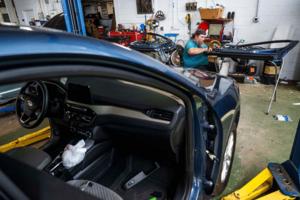
Ford's 2025 recalls have set a record. Here's how the company is trying to change that
A call in January had Malcolm Gordon springing from his seat at work. His infant son was locked inside the family's Ford Mustang Mach-E after his wife had gone to charge the vehicle on her way to pick up their eldest from winter camp.
He drove the half-hour to where his 2021 Mach-E had become unresponsive and broke the window to unlock the ...Read more

Trump EPA moves to nix key Obama-era finding, last remaining tailpipe emission rules
WASHINGTON — The Trump administration moved Tuesday to eliminate the last major environmental regulation on the U.S. auto industry.
The long-expected step came via a proposal to eliminate a key 2009 finding that enabled the U.S. Environmental Protection Agency to regulate greenhouse gas emissions. The repeal of that finding could trigger a ...Read more

Ford secures $3B line of credit amid fluctuating environment
Ford Motor Co. has secured a $3 billion line of credit ahead of another tariff deadline on Friday and amid shifting policy around fuel economy regulations.
The Dearborn automaker can draw upon the funds as it wishes for a year, and it must maintain at least $4 billion in cash during that period, according to the Tuesday filing with the ...Read more

Stellantis reinstates 2025 guidance as new CEO predicts 'tough decisions'
Promising recovery under a new CEO, Chrysler parent Stellantis NV on Tuesday reinstated its annual guidance that in the second half of the year, it will post higher net revenue than in the first half and a low single-digit operating income margin.
The forecast starts providing a picture of what the transition led by Antonio Filosa, who took ...Read more
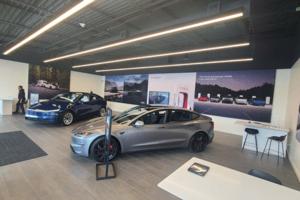
Shopping for an electric vehicle? How long until that $7,500 tax credit expires?
Michael Buday has one eye on the calendar as he makes plans to purchase a used Tesla. The Orange County, California, resident has two months left to take advantage of a federal tax credit that could save him thousands of dollars if he buys an electric vehicle.
The federal government will stop paying a $7,500 incentive for new electric vehicles ...Read more

Motormouth: Aww, nuts!
Q: I just took my 2017 Jeep Compass to the dealer for an oil change and tire rotation. The mechanic said he couldn't do the rotation because all the lug nuts were swollen, due to water that had been behind them, and they could not be put back on after a rotation. Cost: $400, or about $20 per lug nut.
How did water stay there and do damage? I ...Read more

'Trying to be Jeeps': Why automakers are leaning into off-roading trims
Brawny SUVs like the Jeep Wrangler, Toyota Land Cruiser and Ford Bronco were once among a handful of vehicles that came ready to tackle mud, rocks and sand as soon as they left the factory.
Now, carmakers are increasingly adding many of the same stock off-roading features to all types of models: mild-mannered crossovers, three-row family ...Read more
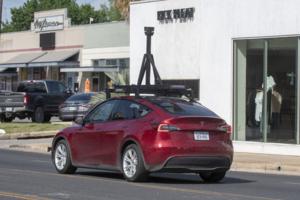
Tesla will start testing its robotaxis in the Bay Area, report says
Elon Musk may be bringing his robotaxis to the Bay Area soon to compete head to head with the other leaders in the driverless vehicle market.
Tesla plans to launch an invite-only service in the Bay Area as soon as this weekend, according to a Business Insider report citing an internal company memo.
The move comes about a month after Tesla ...Read more
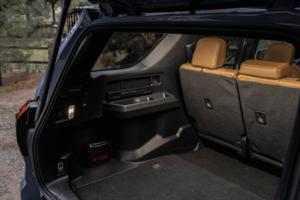
Auto review: The 2025 Toyota 4Runner may be new, but remains familiar
For the first time in 15 years, there’s a new Toyota 4Runner. And while the 2025 edition may be new, it remains what it’s always been: a steel box standing on its toes with the long-term survival instincts of Cher.
Having hibernated without a significant change since the debut of the Apple iPad, the 2025 Toyota 4Runner no longer seems as if...Read more

Auto review: 2025 Ford Maverick Lobo brings a new flavor to the market
As the truck market has continued to grow and develop, consumers have continued to demand more and more of manufacturers. In recent years, Ford released the Maverick, a small compact pickup aimed at drivers with honey-do lists, and took a big gamble by using a previously failed nameplate. In typical Ford fashion, they have capitalized on the ...Read more
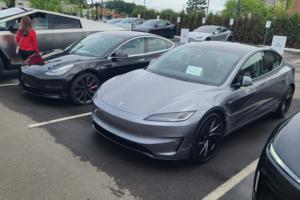
Auto review: Second-gen Tesla Model 3 Performance takes big leap forward (and a step back)
CHARLEVOIX, Michigan — After not touching the steering wheel on Full Self-Driving for an hour and a half up I-75, I exited the freeway at Gaylord. Turning on to the M-32 twisties, I took back the controls — my left thumb searching for the turn signal — from Autopilot. ZOT! The sedan rocketed past 60 mph in less than three seconds, its ...Read more
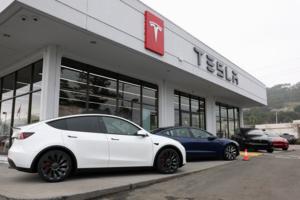
Tesla stock dips as second-quarter earnings reduce investor confidence
Tesla shares tumbled Thursday after its latest earning results knocked the wind out of investors' confidence in Elon Musk's electric vehicle maker.
The company has been facing intense competition, cooling consumer interest and a reduction of the government incentives that made buying EVs more affordable.
Musk, the chief executive, broadcast ...Read more
Popular Stories
- Here's how Ford is responding to the carbon emissions regulation cuts
- Detroit Three fear foreign competitors will pay less in tariffs. Here's what the data show
- Ford issues tariff-hit guidance after reporting Q2 loss from special charges
- Ford's 2025 recalls have set a record. Here's how the company is trying to change that
- Auto review: Genesis G80 gets comfortable in its own skin






